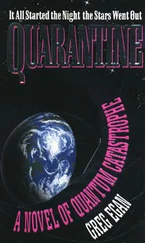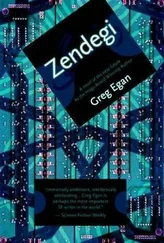Greg Egan - The Clockwork Rocket
Здесь есть возможность читать онлайн «Greg Egan - The Clockwork Rocket» весь текст электронной книги совершенно бесплатно (целиком полную версию без сокращений). В некоторых случаях можно слушать аудио, скачать через торрент в формате fb2 и присутствует краткое содержание. Жанр: Фантастика и фэнтези, на английском языке. Описание произведения, (предисловие) а так же отзывы посетителей доступны на портале библиотеки ЛибКат.
- Название:The Clockwork Rocket
- Автор:
- Жанр:
- Год:неизвестен
- ISBN:нет данных
- Рейтинг книги:3 / 5. Голосов: 1
-
Избранное:Добавить в избранное
- Отзывы:
-
Ваша оценка:
- 60
- 1
- 2
- 3
- 4
- 5
The Clockwork Rocket: краткое содержание, описание и аннотация
Предлагаем к чтению аннотацию, описание, краткое содержание или предисловие (зависит от того, что написал сам автор книги «The Clockwork Rocket»). Если вы не нашли необходимую информацию о книге — напишите в комментариях, мы постараемся отыскать её.
The Clockwork Rocket — читать онлайн бесплатно полную книгу (весь текст) целиком
Ниже представлен текст книги, разбитый по страницам. Система сохранения места последней прочитанной страницы, позволяет с удобством читать онлайн бесплатно книгу «The Clockwork Rocket», без необходимости каждый раз заново искать на чём Вы остановились. Поставьте закладку, и сможете в любой момент перейти на страницу, на которой закончили чтение.
Интервал:
Закладка:
Eusebio wasn’t persuaded. He gestured at his marching figurines; two of them had wound down and come to a halt, while the third had ended up on its back, kicking its legs ineffectually. “In the real world, energy isn’t conserved,” he said. “It comes out of food, or burning fuel, and it vanishes as friction.”
“That might sound like the best explanation,” Yalda said, “but those processes are just more complex examples of the very things we’ve been discussing. Friction turns motion into thermal energy, which is the kinetic energy of the constituents of matter. And chemical energy is believed to be a form of potential energy.”
“I understand that heat is a kind of invisible motion,” Eusebio said, “but how does burning fuel fit into this scheme?”
Yalda said, “The way to make sense of a particle of fuel is to imagine a ball of springs all knotted together tightly, then tied up with string. The action of the liberator is like cutting the string: the whole thing flies apart. But instead of a tearing sound and springs flying everywhere, from fuel you get light and hot gas.”
Eusebio was bemused. “That’s a charming image, but I don’t see how it helps in any practical way.”
“Ah, but it does!” Yalda insisted. “By reacting various chemicals together in sealed vessels—which trap all the products, and turn all the light into heat—people have built up tables showing how much potential energy different substances have, relative to each other. Fuel and liberator are like something on the tenth floor of this tower, while the gases they produce are on the ground floor. The difference in chemical energy manifests itself as pressure and heat, just as the difference in gravitational energy, if you dropped a book from that height, would manifest itself in the book’s velocity.”
Eusebio was growing interested now. “And it all works out? Chemical energy is like a kind of accounting, it’s as simple as that?”
Yalda realized that she might have oversold the idea, just slightly. “In principle it should work, but in practice it’s hard to get accurate data. Think of it as a work in progress. But if you ever go out to the chemistry department—”
Eusebio buzzed amusement. “I’m not suicidal!”
“You can always watch their experiments from behind the safety walls.”
“You mean the ‘safety walls’ that need to be rebuilt three or four times a year?”
The truth was, Yalda had only visited Amputation Alley once herself. She said, “All right… be content to reap the benefits from a distance.”
“You say it’s a work in progress,” Eusebio mused. “Fatal explosions aside, what’s the hitch?”
“I’m no expert in their methodology,” Yalda admitted. “I suppose there’s room for errors to creep in when they measure temperature and pressure, and I expect it’s also hard to trap all the light. We can measure the energy in heat, but if there’s light emitted we don’t know how to account for that.”
“So how exactly do you know that they’ve made mistakes?” Eusebio pressed her. “What is it that tells you that their data is wrong?”
“Ah.” Yalda hated to disillusion him, but she had to be honest about the magnitude of the problem. “Someone showed that the values in the last table they published could be used, indirectly, to derive the result that pure, powdered firestone and its liberator contained only slightly more chemical energy than the gases they produce—nowhere near enough to explain the high temperature of the gases. But that extra thermal energy can’t just fall out of the sky; it has to come from a change in chemical energy. And that’s before you even start worrying about the energy carried off by the light.”
“I see,” Eusebio announced cynically. “So ‘chemical energy’ is a beautiful theory… but after all that risk and toil, the results show that it’s actually nonsense?”
Yalda preferred a different interpretation. “Suppose I told you that a friend of a friend of mine had seen a pebble drop from a third floor window, but you knew that the pebble in question had hit the ground with a deafening crash, and made a crater two strides deep. Would you throw out the whole idea of conservation of energy… or would you doubt my third-hand account of the height from which the pebble had fallen?”
Yalda squeezed into the lecture theater just as the guest speaker, Nereo, began ascending to the stage. There were only about four dozen people in the audience, but the venue had been chosen for its facilities, not its capacity, and the optics classes that were given here usually attracted just a couple of dozen students. Her late entry brought some resentful glares, but at least her height gave her the advantage of not needing to jostle for position—and when she realized that she was blocking the view of the young man behind her, she quickly changed places with him.
“My thanks to the scientists of Zeugma for their generous invitation to speak here today,” Nereo began. “I am delighted to have this opportunity to discuss my recent work.” Nereo lived in Red Towers, where his research was supported by a wealthy patron. With no university there, he had no colleagues around him to challenge or encourage him, though perhaps the whims of a rich industrialist were less onerous to deal with than Zeugma’s academic politics.
“I am confident,” Nereo continued, “that this learned audience is intimately familiar with the competing doctrines regarding the nature of light, so I will not spend time recapitulating their strengths and weaknesses. The wave doctrine rose to favor over the particle doctrine more than a year ago, when our colleague Giorgio showed that two narrow slits in an opaque barrier, illuminated with light of a single color, cast a pattern of alternating bright and dark regions—as if waves emerging from the two slits were slipping in and out of agreement with each other. The geometry of this pattern provided a means of estimating the light’s wavelength—and the measurements suggested a wavelength for red light about twice that for violet.”
Yalda looked around for Giorgio, her supervisor; he was standing near the front of the audience. She’d found his experiments persuasive, though many long-time proponents of the particle doctrine were unmoved. Why invoke some fanciful notion of “wavelength”, they argued, when every child who’d ever glanced up at the stars could see that what distinguished one color of light from another was simply its speed of travel?
“With all respect to my colleague, though,” Nereo said, “the double-slit pattern has often proved difficult to work with. The pattern is faint and the features that we wish to locate precisely can be indistinct, leading to considerable uncertainty in the measurements. In the hope of remedying these problems, I have investigated a natural extension of Giorgio’s idea.
“Suppose we obtained a large number of identical sources of any vibration, and arranged them in a line in a regular fashion, with a spacing roughly comparable to, but exceeding, the wavelength of the vibration itself.”
An image appeared on Nereo’s chest.

“If we ask in what direction the wavefronts from all these sources will come into agreement,” he said, “the answer is that, firstly, they will agree if you move orthogonally away from the line on which they lie. However, that’s not the only case. They will also agree at another angle, at a particular inclination to the central direction on either side.”

Интервал:
Закладка:
Похожие книги на «The Clockwork Rocket»
Представляем Вашему вниманию похожие книги на «The Clockwork Rocket» списком для выбора. Мы отобрали схожую по названию и смыслу литературу в надежде предоставить читателям больше вариантов отыскать новые, интересные, ещё непрочитанные произведения.
Обсуждение, отзывы о книге «The Clockwork Rocket» и просто собственные мнения читателей. Оставьте ваши комментарии, напишите, что Вы думаете о произведении, его смысле или главных героях. Укажите что конкретно понравилось, а что нет, и почему Вы так считаете.










